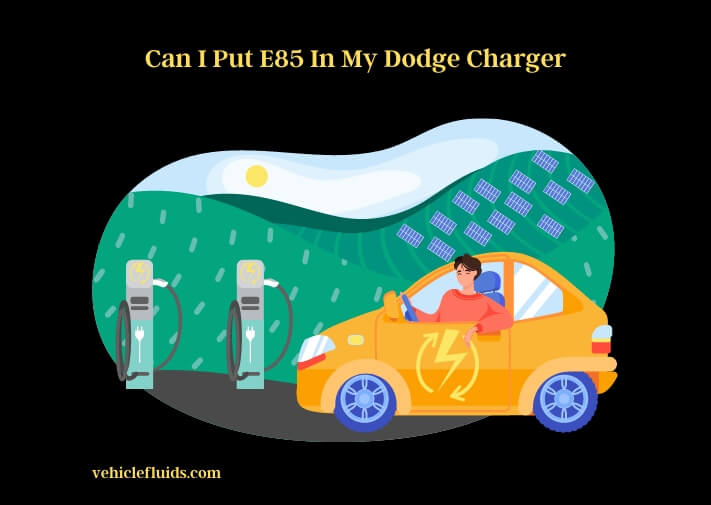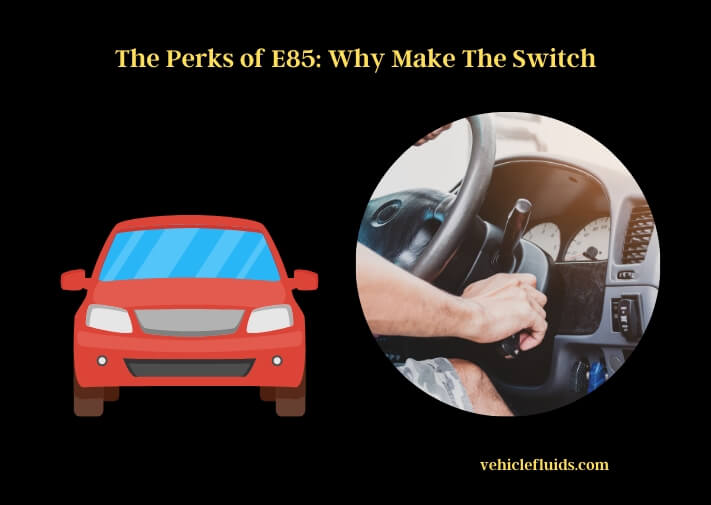Whether you can put E85 in your Dodge Charger depends on if the vehicle is flex-fuel capable. Not every Charger can safely use this type of fuel.
Your Dodge Charger might be eligible to run on E85 if it is a flex-fuel model. If uncertain, one straightforward way to verify is by checking the inside of your fuel door or consulting your vehicle’s owner manual. Using E85 in a non-flex fuel vehicle can lead to significant damage to the engine and fuel system components. It is pertinent to ensure your vehicle’s compatibility before fueling with E85.

Some drivers have pursued E85 conversion kits for their vehicles, such as Dodge Challengers or Rams. A popular choice is the 5.7 Hemi E85 conversion kit. With such a kit, a car originally not designed for E85 use can safely handle this biofuel. Although E85 offers potential benefits like increased horsepower – a notable feature of the E85 Scat Pack – it’s not as simple as switching fuels. Conversion requires significant modifications and should be carried out by a professional to avoid risking damage to your vehicle.
Considering a Charger RT for E85 usage could be a possibility. However, similar to other Dodge models, only if the Charger RT is flex-fuel compatible can it utilize E85. Before taking any decisions, always make sure to validate the vehicle’s flex-fuel status. It’s crucial to remember that using E85 on non-flex fuel cars, even robust models like the 5.7 Hemi, can lead to severe damages, making it imperative to confirm whether your Dodge Charger is flex-fuel or not.
E85: The Core Components
Composition and Production of E85
E85 is a biofuel mixture, predominantly comprised of ethanol (approximately 51% to 83%), the balance being traditional gasoline. Produced through the fermentation of sugars from crops such as corn or sugarcane, this high-octane fuel can provide notable performance benefits.
Pros and Cons of E85 Usage
E85 has a higher octane rating than regular gasoline, which can boost engine performance. It’s renewable, reduces reliance on fossil fuels, and can lower greenhouse gas emissions. Yet, it’s not all positive – E85 has a lower energy content per gallon than gasoline, leading to reduced fuel economy.
Dodge Charger: A Brief Overview

Origins and Evolution
The Dodge Charger, a symbol of American muscle, has a rich heritage dating back to 1966. Over the years, it has evolved, retaining its distinctive power and performance characteristics while integrating modern technology and conveniences.
Performance Attributes
Equipped with powerful engines, ranging from V6 to V8 options, the Dodge Charger delivers an exhilarating driving experience. Superior handling, smooth ride quality, and aggressive acceleration underscore its performance credentials.
Fuel Options for Dodge Charger
| Fuel Type | Pros | Cons |
| Regular Gasoline | Widely available; Optimal fuel economy | Non-renewable; Higher emissions |
| Premium Gasoline | Potential performance boost | More expensive; Non-renewable |
| E85 | Renewable; Lower emissions; Enhanced performance | Lower fuel economy; Limited availability |
Comparing Different Fuel Types
Each fuel type has its unique benefits and drawbacks. Regular gasoline is readily available and provides optimal fuel economy. Premium gasoline may offer a slight performance boost but is more expensive. E85, while renewable and offering performance benefits, suffers from limited availability and lower fuel economy.
Suitability of E85 for Dodge Charger
Certain models of the Dodge Charger, specifically the flex fuel vehicles (FFVs), can run on E85. In the following sections, we’ll delve deeper into this topic.

E85 Compatibility Across Dodge Charger Models
Flex Fuel Vehicles (FFVs): An Overview
Flex fuel vehicles are designed to run on more than one type of fuel, usually gasoline blended with either ethanol or methanol fuel. These vehicles have modified engines and fuel systems to accept the different fuel compositions.
Identifying FFV Models within the Dodge Charger Line-up
Check the fuel door or owner’s manual of your Dodge Charger to see if it’s a FFV. Typically, there will be a label or badge indicating this compatibility. Only these models should use E85.
The Mechanics of E85 in a Dodge Charger
Real-World Experiences with E85
Owners of Dodge Charger FFVs report a variety of experiences with E85. While some enjoy the performance enhancement, others notice a dip in fuel economy. Each driver’s experience will depend on the particular model, driving conditions, and personal driving style.
Performance and Fuel Economy Metrics
E85 can offer a higher octane rating, which may improve performance. On the flip side, since E85 contains less energy per gallon compared to gasoline, it may result in a decrease in fuel economy.
Conversion to E85: The Process
Hardware Modifications Required
Converting a non-FFV Dodge Charger to run on E85 is a technical process involving changes to the fuel system, including the fuel injectors and fuel pump, and updating the engine control unit (ECU) software.
Legal Implications and Warranty Concerns
Before considering a conversion, remember that modifications could void your vehicle’s warranty. They may also not be legal in certain jurisdictions. Always consult with a professional and research local laws before proceeding.
E85 Availability and Pricing in the US
| Area | Number of E85 Stations | Average Price per Gallon |
| Northeast | 250 | $2.45 |
| Midwest | 2,500 | $2.35 |
| South | 1,000 | $2.40 |
| West | 800 | $2.60 |
Distribution of E85 Fuel Stations
While E85 is available across the country, its distribution is uneven. The Midwest, where much of the corn for ethanol is grown, has the highest number of E85 stations.
E85 versus Regular Gasoline Costs
On average, E85 is less expensive per gallon than regular gasoline. However, given that E85 has a lower energy content and thus yields fewer miles per gallon, the overall cost per mile might be higher.
Environmental Impact of E85
E85’s Role in Greenhouse Gas Emission Reduction
E85 helps reduce the total greenhouse gas emissions, especially carbon dioxide, due to the lifecycle of ethanol. The crops used in ethanol production absorb CO2 as they grow, offsetting some of the emissions when the fuel is burned.
The Ecological Footprint of Ethanol Production
While E85 usage reduces fossil fuel dependence, the production process for ethanol involves considerable energy and water use, and can contribute to deforestation and soil erosion. Balancing these factors is key to assessing the overall environmental impact.
Caring for Your E85 Dodge Charger
Special Maintenance Requirements for FFVs
While FFVs like the Dodge Charger can run on E85 without any special maintenance, it’s always advisable to follow the manufacturer’s recommended maintenance schedule, ensuring the vehicle performs optimally.
Tips for Prolonging Vehicle Life
To maintain your E85-fueled Dodge Charger, it’s best to use high-quality fuel from reputable stations. Monitor your vehicle for any changes in performance, and if noted, have your vehicle checked by a professional promptly.

Expert Opinions on E85 and the Dodge Charger
| Expert | Viewpoint |
| Expert A | “E85 can boost Dodge Charger’s performance but may impact fuel economy.” |
| Expert B | “For FFVs, E85 is a viable option. For non-FFVs, modifications may not justify the costs and potential warranty voidance.” |
| Expert C | “With varying E85 availability, consider the practicality of E85 use in your area.” |
Industry Perspectives on E85 in Dodge Chargers
Experts hold varied opinions on the use of E85 in Dodge Chargers. Some focus on the performance benefits, while others stress the practical implications such as reduced fuel economy and regional E85 availability.
E85 vs. Traditional Fuels Debate
The E85 versus traditional fuels debate continues, with experts acknowledging the potential environmental and performance benefits of E85 but also the practical and economic challenges posed by its lower energy content and uneven distribution.
Looking Forward: The Future of E85 and the Dodge Charger
Dodge’s Stance on Alternative Fuels
Dodge, as part of Stellantis, is committed to a greener future. While their current focus seems to be on electrification, alternative fuels like E85 remain an integral part of their sustainability strategy.
Projected Developments and Innovations
Advancements in biofuel technology and vehicle design promise an exciting future for E85 and vehicles like the Dodge Charger. Increased E85 distribution, improved fuel economy, and the integration of biofuels into electrification strategies could reshape the automotive landscape.
Frequently Asked Questions
Is the 5.7 Hemi Flex Fuel?
Yes, certain 5.7 Hemi engine models are designated as flex-fuel and can run on E85, regular gasoline, or a blend of both. Always refer to your vehicle’s manual or the label inside the fuel door to confirm.
What Is an E85 Hemi?
An E85 Hemi refers to a Hemi engine that is capable of running on E85 fuel. E85 is a blend of 51% to 83% ethanol and the rest gasoline, and vehicles with these engines are often called Flex Fuel Vehicles (FFVs).
Can My Truck Use E85 Gas?
Whether your truck can use E85 depends on whether it is a Flex Fuel Vehicle (FFV). FFVs can run on E85, regular gasoline, or any blend of the two. Check your owner’s manual or the fuel door for FFV labeling.
Does a Ram 1500 Flex Fuel Kit Exist?
Yes, there are aftermarket kits available to convert certain Ram 1500 models to flex fuel capabilities. Before purchasing, ensure the kit is suitable for your specific model and be aware that such modifications could void your vehicle’s warranty.
Why Would I Want an E85 Conversion Kit for My 5.7 Hemi?
With an E85 conversion kit, your 5.7 Hemi could run on E85, potentially enhancing performance due to E85’s higher octane rating. However, the conversion should be carried out by a professional to avoid damaging your engine.
Are Dodge Chargers Flex Fuel?
Some models of Dodge Charger are indeed flex-fuel capable. Flex Fuel Vehicles (FFVs) can operate on gasoline, E85, or a mixture of both. Check your vehicle’s manual or the fuel door to determine if your Charger is an FFV.
Can a Dodge Charger Use E85?
Yes, if the Dodge Charger is a Flex Fuel Vehicle (FFV), it can run on E85, regular gasoline, or any blend of the two. Always verify FFV status in your vehicle’s manual or look for an FFV label near the fuel cap.
Read more:
- Can I Put Sunflower Oil In My Diesel Car?
- Why is Oil Leaking Out of My Car Turbo Pipe?
- Can Low Engine Oil Cause The Car To Rev?
- What Does a Car’s Oil Warning Light Mean?
- Identifying and Fixing Oil Puddles Under Your Car
- Why is Engine Oil Carbonizing My Car Plugs?
References
Additional Resources
